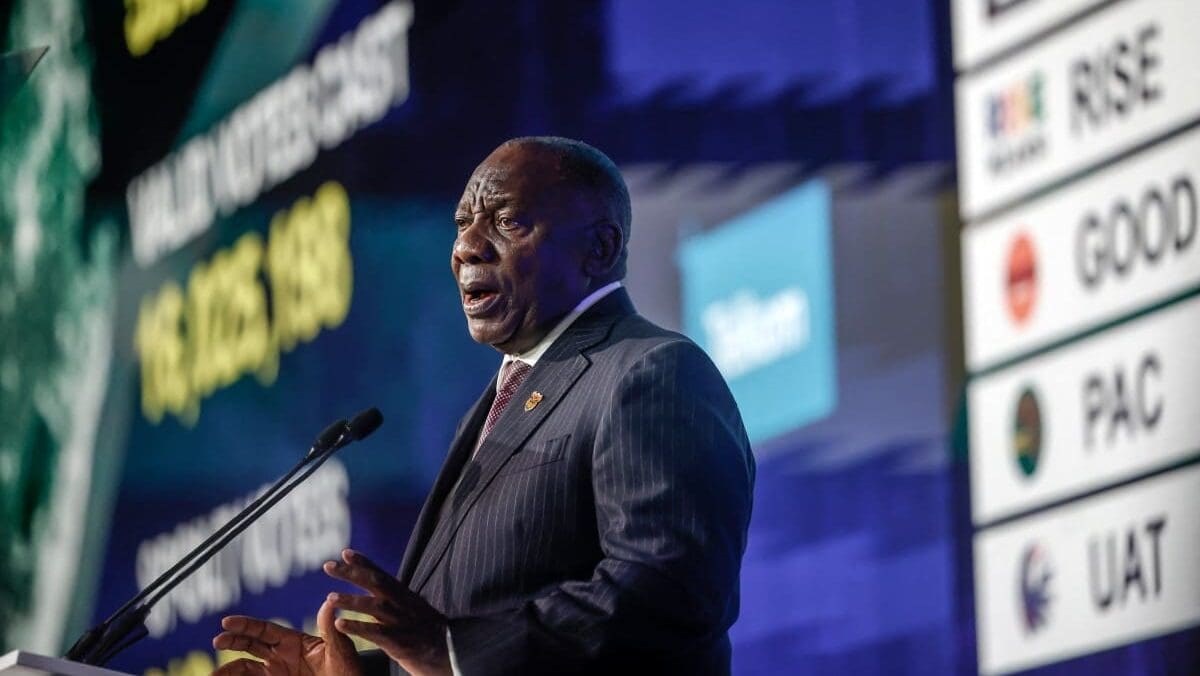
South African President and President of the African National Congress (ANC) Cyril Ramaphosa delivers his remarks after the official announcement of the South African general election results in the Independent Electoral Commission (IEC) National Results Center at the Gallagher Convention Centre in Midrand, on June 2nd, 2024.
Photo: PHILL MAGAKOE / AFP
Last week’s South African elections results, announced on Sunday, show that the ruling African National Congress (ANC) party lost its absolute majority in parliament, forcing it to form a new coalition for the government to survive.
Securing only 40% of the vote, the outcome is a severe blow to the party, Africa’s oldest liberation movement. Once viewed by the U.S. as a terrorist organization, it was removed from the American list of proscribed terrorist organizations in 1988.
The ANC has ruled the country since its then-leader Nelson Mandela became president in 1994, ending white minority rule.
The largest opposition party, Democratic Alliance (DA), received 21% of the vote, followed by Jacob Zuma’s recently formed left-populist party uMkhonto weSizwe (MK) that got over 14% of the vote.
Zuma, 82, was the leader of the ANC and president of South Africa until he was replaced by Cyril Ramaphosa in both positions. Since then, the two have not been able to see eye to eye.
On Monday, President Ramaphosa, 71, a protegé of Mandela’s, called on South Africa’s political parties to work together for the good of the country.
Mounting anger at bad employment prospects, corruption, inequality, rolling blackouts, and overall poor infrastructure (in particular its roads have become infamous) cost the ANC a 17.3% drop in support, from the 57.5% of the vote it secured in the 2019 parliamentary elections.
For party leader and president Ramaphosa, cooperation with the center-right Democratic Alliance (DA) is the best option. Between them, they would have enough seats in Parliament to govern. But this would never be more than a marriage of convenience, as the DA has been fiercely critical of the ANC’s policies for years.
Speaking to The European Conservative, Ernst Roets of the South African Solidarity Movement, a family of community organizations with more than 500,000 members whose foundation is Christian-Democratic and strives for mutual recognition of and respect between race groups, said that, of all four largest parties in South Africa (ANC, DA, MK, and EFF), “only one isn’t socialist— the DA. Working with the DA would certainly be the best option, and it seems, at least for now, to be the most probable.”
Domestically as well as internationally, going with the DA would also beat linking arms with one or both of the other main opposition parties, Zuma’s MK and the Economic Freedom Fighters. Either one of those would scare off foreign investors, given that MK and the EFF have both pledged to nationalize South Africa’s gold and platinum mines as well as the central bank.
Even worse, the EFF, Julius Malema’s openly Marxist party, which got only 9% of the vote this time compared to 2019’s 11%, is infamous for the openly anti-white statements made by its leader. As recently as last February, he again called for whites to be killed at a campaign event.
EFF party leader Julius Malema is once again yelling "Kill the Boer, the Farmer" along with his genocidaI supporters.
— End Wokeness (@EndWokeness) February 6, 2024
This genocidaI maniac has a solid shot at becoming the next PM of South Africa.
The election is a few months away.pic.twitter.com/G479wa0JmH
A video showed Malema singing the “Kill the Boer” song, which calls for “farmers” (that is, white South Africans) to be killed.
Tech billionaire Elon Musk, who was born in South Africa, then reacted with concern that Malema is “openly encouraging genocide.”
He is openly encouraging genocide
— Elon Musk (@elonmusk) February 6, 2024
About four million whites currently live in South Africa, a country of 59.9 million. Recent years have seen a spike in brutal assaults on their communities, frequently with fatal consequences. In September of last year, there was one murder a week on white-owned farms in the country.
John Steenhuisen, 48, head of the DA and the only white leader among the four main parties, has said his party is open to talks with various parties, except the MK and the EFF, whose ideologies make them unpalatable for his party.
While the ANC’s cooperation with either the MKK or the EFF seems unlikely—as well as an undesirable prospect, given that the DA has signaled it would pull out, should it happen—Ramaphosa continuing his presidency is also up for debate.
In South Africa, lawmakers elect the president, and Ramaphosa’s ANC now doesn’t have enough lawmakers on its own to reelect him.
Political parties now have two weeks to work out a deal before the new parliament sits to choose a president, who would likely be drawn from the ANC’s ranks since it remains the biggest political entity.
